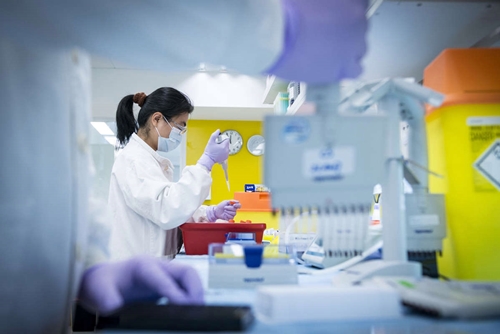25 January 2016. Three pharmaceutical companies and three universities in the U.K. are forming an independent consortium to support academic research leading to new therapies. The £40 million ($US 57 million) Apollo Therapeutics Fund will be financed by contributions from global pharmaceutical enterprises AstraZeneca, GlaxoSmithKline, and Johnson & Johnson, for work in research labs at University of Cambridge, University College London, and Imperial College London.
Apollo Therapeutics Fund plans to support translational research at the three universities through discovery, preclinical, and early developmental stages, with the goal of speeding the transfer of academic science to the marketplace. As new discoveries with commercial potential take shape, the three companies will bid on taking the research findings forward or the universities will license the technology directly to one of the companies.
All therapy areas and types of treatments — e.g., antibodies, cell or gene therapies, small molecules — are covered under Apollo Therapeutics. An independent drug discovery committee inside Apollo, comprised of former industry scientists, will identify research in early stages and advise labs on shaping their work to better result in commercial development. A separate investment committee with representatives form all parties in the Apollo consortium will make funding decisions.
Ian Tomlinson, a former vice-president for worldwide business development at GlaxoSmithKline, will chair Apollo’s investment committee. “Apollo provides an additional source of early stage funding,” says Tomlinson in a joint statement, “that will allow more therapeutics projects within the three universities to realize their full potential. The active participation of the industry partners will also mean that projects will be shaped at a very early stage to optimize their suitability for further development.”
The 6-year consortium is funded by contributions of £10 million from each of the companies, with the technology transfer offices at each of the universities adding another £3.3 million. Universities responsible for initiatives that become successful products will receive half of all future commercial revenues or licensing fees from the companies, while the other consortium members will equally divide the remaining revenues.
Read more:
- Genomic, Patient Data Integrated for Precision Medicine
- Alliance Plans Adaptive Clinical Trials for Brain Cancer
- Alliance Mounts Comprehensive ALS Research Program
- Research, Finance Alliance to Fast-Track Alzheimer’s Drugs
- Alliance to Collect Mobile Health Data for Clinical Trials
Disclosure: the author owns shares in Johnson & Johnson
* * *


 RSS - Posts
RSS - Posts
You must be logged in to post a comment.